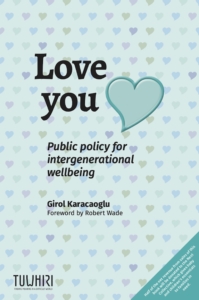
Professor of Policy Practice, Victoria University of Wellington
The former Chief Economist of The Treasury in New Zealand has written a book examining the processes by which wellbeing-focused public policy objectives can be established, prioritised, funded, implemented, managed, and evaluated.
Professor Girol Karacaoglu is Head of the School of Government at Victoria University of Wellington and was previously New Zealand’s Chief Economist of The Treasury. Before then, he was the Chief Executive of PSIS (then Co-operative Bank of New Zealand) for nine years. His new book asks:
HOW WOULD WE DESIGN, IMPLEMENT AND EVALUATE PUBLIC POLICY IF IT WERE BASED ON OUR LOVE FOR FUTURE GENERATIONS?
For the philosopher Water Kaufman, ‘I love you’ means:
I want you to live the life that you want to live.
I will be as happy as you if you do; and as unhappy as you if you don’t.
Professor Karacaoglu said that ‘wellbeing is about the ability of individuals and communities to live the lives they value – now and in the future. This is their human right. It would be extremely unjust to prevent the enjoyment of lives centred on chosen values. Preventing such injustice across generations should be the focus of a public policy that has intergenerational wellbeing as its objective.’
‘Half of the net revenue from sales of this book will be donated to The Nest Collective, which gives baby and children’s essentials to families in need’, he said.

Tuwhiri publisher Ramsey Margolis said that ‘while humanity may well come to grips with the current pandemic in the foreseeable future, ballooning inequalities and injustice threaten to shred the fabric of our societies, and the climate emergency menaces all life forms on the planet.
‘In the face of these enduring humanity-induced catastrophes, we owe a special duty of care to future generations to overcome them, and to leave our successors with a safer, fairer world in which they may thrive. We need to express our care for coming generations in many ways, from changing own personal lifestyles, to choosing political representatives who advance cogent, long-sighted policies in aid of a better world.”
Find out more and order the book via the publisher Tuwhiri
the discussion?
Let us know what
you would like
to write about!
